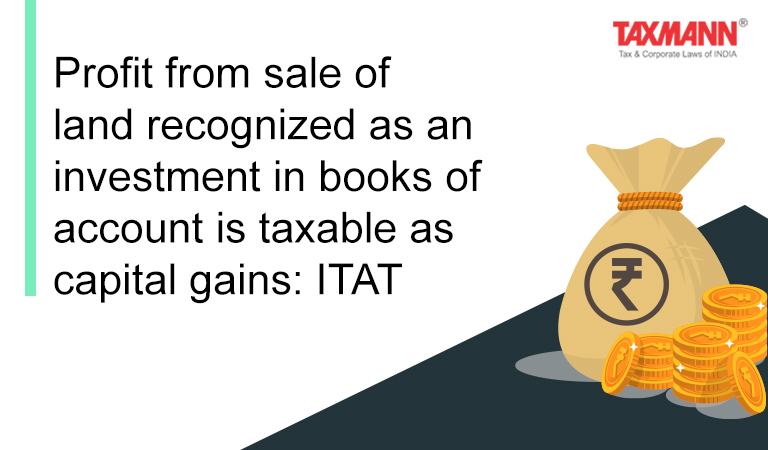Profit from sale of land recognized as an investment in books of account is taxable as capital gains: ITAT
- Blog|News|Income Tax|
- 3 Min Read
- By Taxmann
- |
- Last Updated on 8 October, 2021

Case Detaials: JCIT v. Adrus Estate and Properties - [2021] 130 taxmann.com 455 (Pune - Trib.)
Judiciary and Counsel Details
-
- Inturi Rama Rao, Accountant Member and Partha Sarathi Chaudhary, Judicial Member
- Percy Paridwala and Sukhsagar Syal for the Appellant.
- Sudhendudas for the Respondent
Facts of the Case
Assessee-company was converted into Limited Liability Partnership (LLP). It had entered into an MOU to sell said agricultural land to the Maharashtra Cricket Association (MCA) for a consideration of a certain amount. Assessee had offered the profit on the sale of the said land under the head of ‘capital gains’.
The assessing Officer (AO) observed that assessee was formed only for the purpose of dealing in the land. It had generated huge profits from sale of land, and thus the transaction was in the nature of adventure in trade. Accordingly, profit was liable brought to tax out of such sale under the head ‘income from business or profession’.
On appeal, CIT(A) reversed the order AO. Aggrieved-AO filed the instant appeal before the Pune ITAT.
ITAT Held
The Pune ITAT held that it is a settled position of law that to determine whether a particular transaction is an adventure in the nature of trade or investment, the test to be applied is the intention of the party at the time of acquisition of the property.
Thus, if an asset is purchased by way of investment, the transaction does not become an adventure in the nature of trade on the mere fact that assessee had generated a huge profit on sale.
Then treatment given in the books of account gives an indication as to the intention of the assessee to hold asset as an investment or stock-in-trade. In the instant case, the land was shown as part of investment in the books of account coupled with the fact that the land was sold after a gap of six years would prima facie go to show that the intention on the part of the respondent/assessee is to hold the said land as ‘investment’.
Onus lies upon the department for bringing the relevant material on record to prove that the transaction is an adventure in nature of trade. There was no material brought on record by the AO to indicate that the land was purchased by the assessee with an intention to resale for profit. Thus, profits arising on sale of land by assessee were to be treated as ‘capital gains’.
Case Review
-
- CIT v. Sutlej Cotton Mills [1975] 100 ITR 706 (SC) (para 14)
- Dalmiya and Cements Ltd. v. CIT [1976] 105 ITR 633 (SC) (para 14) followed.
List of Cases Referred to
-
- CIT v. Baguio Investment (P.) Ltd. [IT Appeal No. 998 of 2011, dated 24-1-2013] (para 4)
- Janki Ram Bahadur Ram v. CIT [1965] 57 ITR 21 (SC) (para 11)
- CIT v. Nathuram Ramnarayan (P.) Ltd. [1985] 151 ITR 767/[1964] 18 Taxman 355 (Bom.) (para 11)
- CIT v. Kasturi E-states (P.) Ltd. [1966] 62 ITR 578 (Mad.) (para 11)
- Pr. CIT v. Jhon Poomkudy [2019] 101 taxmann.com 244/261 Taxman 56/[2018] 409 ITR 149 (Ker.) (para 11)
- Kirloskar Electric Co. Ltd. v. CIT [1997] 228 ITR 674 (Kar.) (para 12)
- CIT v. Kasturi Estate (P.) Ltd. [1966] 62 ITR 578 (Mad.) (para 12)
- G. Venkataswami Naidu & Co. v. CIT [1959] 35 ITR 594 (SC) (para 14)
- CIT v. Sutlej Cotton Mills Supply Agency Ltd. [1975] 100 ITR 706 (SC) (para 14)
- Dalmia Cements Ltd. v. CIT [1976] 105 ITR 633 (SC) (para 14).
Disclaimer: The content/information published on the website is only for general information of the user and shall not be construed as legal advice. While the Taxmann has exercised reasonable efforts to ensure the veracity of information/content published, Taxmann shall be under no liability in any manner whatsoever for incorrect information, if any.

Taxmann Publications has a dedicated in-house Research & Editorial Team. This team consists of a team of Chartered Accountants, Company Secretaries, and Lawyers. This team works under the guidance and supervision of editor-in-chief Mr Rakesh Bhargava.
The Research and Editorial Team is responsible for developing reliable and accurate content for the readers. The team follows the six-sigma approach to achieve the benchmark of zero error in its publications and research platforms. The team ensures that the following publication guidelines are thoroughly followed while developing the content:
- The statutory material is obtained only from the authorized and reliable sources
- All the latest developments in the judicial and legislative fields are covered
- Prepare the analytical write-ups on current, controversial, and important issues to help the readers to understand the concept and its implications
- Every content published by Taxmann is complete, accurate and lucid
- All evidence-based statements are supported with proper reference to Section, Circular No., Notification No. or citations
- The golden rules of grammar, style and consistency are thoroughly followed
- Font and size that’s easy to read and remain consistent across all imprint and digital publications are applied



 CA | CS | CMA
CA | CS | CMA
